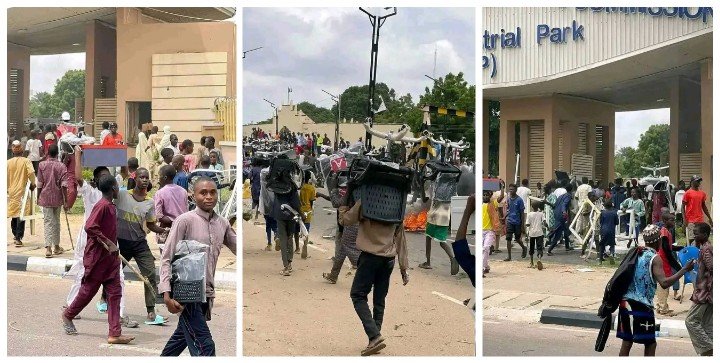Images showing some youths carrying looted items from an Industrial Park in Kano
By Africa Publicity Editorial Team
Some of the ‘End Bad Governance Protesters’ in Nigeria have been tagged by many as “hoodlums” for allegedly looting stores and an Industrial Park in Kano. But we sincerely think ‘hoodlums’ who steal chairs, and foodstuffs publicly due to hunger and bad governance are far better than bunch of silly and greedy politicians who steal millions and billions of Naira or dollars, denying poor citizens quality healthcare, education and decent livelihoods. Corruption and bad governance have long plagued Nigeria, hindering its progress and impacting the lives of its citizens, particularly the youth. This pervasive issue has stunted economic growth and eroded trust in public institutions and leadership.
The Scope of Corruption
Corruption in Nigeria manifests in various forms, from bribery and embezzlement to nepotism and electoral fraud. The country’s vast oil wealth has often been siphoned off by corrupt officials, leaving little for development projects, healthcare, education, and infrastructure. This misappropriation of funds results in poor public services and a lack of opportunities for young people.
Impact on the Youth
Nigeria has a youthful population, with over 60% under 25. Despite this demographic advantage, young Nigerians face significant challenges due to corruption and poor governance:
1. Unemployment: The youth unemployment rate is alarmingly high, driven by a lack of job creation and nepotism in hiring practices. Many young people struggle to find gainful employment, leading to widespread frustration and disillusionment.
2. Education: The education sector suffers from inadequate funding and mismanagement. Poor infrastructure, insufficient teaching materials, and underpaid staff are common issues. As a result, many young Nigerians do not receive a quality education, limiting their future prospects.
3. Healthcare: Corruption has severely affected the healthcare system, leading to inadequate facilities and a shortage of essential medicines. Young people, especially in rural areas, often lack access to basic healthcare services.
4. Political Disenfranchisement: Many young Nigerians feel excluded from the political process. Electoral fraud, vote-buying, and the dominance of older politicians discourage youth participation and erode faith in democratic institutions.
Frustrations and Reactions
The frustrations of young Nigerians are palpable and have led to various forms of activism and protest:
1. #EndSARS Movement: In 2020, the #EndSARS movement gained international attention as young Nigerians protested against police brutality and corruption. This movement highlighted the broader issues of bad governance and the demand for systemic change.
2. Social Media Activism: Young Nigerians have increasingly turned to social media to voice their grievances, mobilize support, and hold leaders accountable. Platforms like Twitter and Instagram have become vital tools for raising awareness and organizing protests.
3. Entrepreneurship and Innovation: Despite the challenges, many young Nigerians have shown resilience by turning to entrepreneurship. They are leveraging technology and innovation to create new opportunities, driving economic growth from the grassroots level.
The Way Forward
Addressing corruption and bad governance in Nigeria requires a multifaceted approach:
1. Strengthening Institutions: Enhancing the capacity and independence of anti-corruption agencies is crucial. Ensuring that these bodies can operate without political interference will help in holding corrupt officials accountable.
2. Electoral Reforms: Implementing reforms to ensure free and fair elections is essential. This includes measures to prevent vote-buying, and electoral fraud, and enhance the transparency of the electoral process.
3. Education and Awareness: Promoting civic education and awareness about the dangers of corruption can empower young people to demand better governance. Education reforms that prioritize critical thinking and ethical leadership are also necessary.
4. Youth Engagement: Encouraging and facilitating greater youth participation in politics and decision-making processes is vital. This can be achieved through policies that promote inclusivity and by creating platforms for young voices to be heard.
In conclusion, the frustrations of young people in Nigeria are deeply rooted in the systemic issues of corruption and bad governance. While the challenges are significant, the resilience and activism of Nigeria’s youth offer hope for a future where transparency, accountability, and good governance prevail.








